I am an unashamed romantic—but I have some stipulations. The romance mustn’t be the type that pops up out of the blue, just by two people looking at each other. It mustn’t consist of just staring, pop-eyed and with a silly grin, at each other. Most important, it must end happily. The ride into the sunset, or the fadeout on a heart-and-soul smooch, is of paramount importance.
That said, here’s one utterly lovely romance I saw a few weeks back. And then again yesterday, just because it was so wonderful.
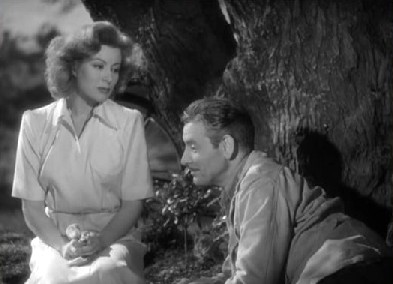
In the autumn of 1918, in the Melbridge County Asylum, the military wing is home to an officer (Ronald Colman) who was wounded in the trenches at Arras in 1917. He’s lost his memory and has no idea who he is. He doesn’t even remember his name, so they call him Smith. He’s a diffident, unhappy man, mentally groping in the dark for his own identity, drawing deeper into himself with every passing day.

One day, an elderly couple whose son went missing at Arras come to see if Smith’s their son, but turn away, disappointed. Smith is equally, if not more, disappointed: he’d hoped for someone to call his own, even if he can’t recognise them.
A peasouper of a fog is coming on, but Smith puts on his overcoat and goes for a walk in the asylum’s grounds. As he’s walking, there’s a hullabaloo (World War I has just been declared over, and everybody’s spilling out onto the streets, rejoicing). In all the excitement, the asylum guards go out to join the celebrating crowds, and leave the wicket gate open. Smith steps out, and walks into town.
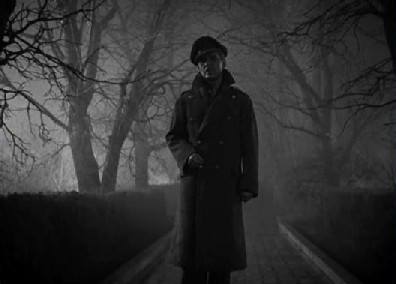
In Melbridge, Smith enters a tobacconist’s. He’s so unsure of himself that when the woman behind the counter asks what he wants, he stammers and gets frightened. The woman realises he’s escaped from the asylum, and she slips away inside.

Smith is standing in the shop, undecided, when another visitor—a pretty girl called Paula Ridgeway (Greer Garson)—tells him he’d better get out, because the tobacconist has certainly gone to phone the asylum. In fact, seeing the state he’s in, Paula takes Smith under her wing. She takes him off to the Melbridge Arms, where the bartender, the `Biffer’ (Reginald Owen) is her friend. She chatters nineteen to the dozen with Smith (she calls him `Smithy’), putting him at his ease, and tells him she’s a music hall dancer.

Since she can’t figure out what to do with Smithy, (he’s obviously unable to manage on his own), Paula takes him to her dressing room. When it’s time for her to go on stage, she puts a chair out for him on the landing so he can watch her dance. Paula’s a big hit on the stage:

Smithy, who’s exhausted, passes out during the revelries that succeed the show (everybody’s still celebrating the end of the war). When he comes to, he finds himself being looked after by Paula and the Biffer. Paula also tells him that her boss, Sam (Rhys Williams) has offered to give Smithy a job with the touring company. She doesn’t tell Smithy she’s the one who’s wheedled Sam into it.
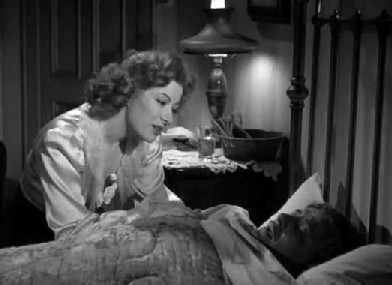
But a chance remark by a policeman at the bar alerts Sam: he realises Smithy has escaped from the asylum. He takes back the offer of a job, and Paula tells Smithy that he’d better leave before the people from the asylum come for him. In the very next breath, she sees Smithy isn’t up to going anywhere or doing anything on his own. So Paula, kind and concerned as always, gathers up her things, tells Smith to wait for her, and goes to pay Biffer. When she comes back, it’s to find that Smithy’s knocked out Sam, who tried to stop him.
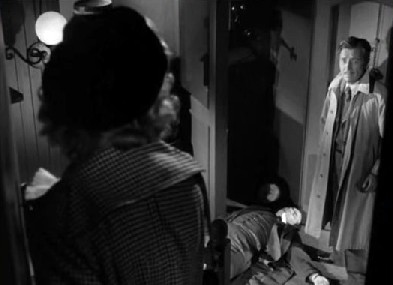
Paula doesn’t wait to see what condition Sam’s in. She drags Smithy off to the railway station and gets both of them onto a train to Devon. They fetch up at a picturesque little town called Clevedon, from where Paula phones the Biffer to check on Sam. Sam’s all right, and doesn’t intend to press charges against Smithy. Ecstatic, Paula and Smithy decide to stay on in Clevedon for the time being, where they hire rooms at the local hotel.

Paula begins to learn typing, and Smithy, who has a flair for writing, manages to get some articles published in a Liverpool newspaper. He’s happy, much more self-assured than he was, and very much in love with Paula. He finally proposes, she accepts joyfully, and they’re married. All’s bliss and poetry and roses.

And there’s more happiness to come. In November 1920, their baby John is born, and Smithy dotes on his new son. He’s ecstatic, and is even more elated when a telegram arrives from the Liverpool newspaper, asking him to come to their offices for an interview. If Smithy can get a job, it’ll be perfect. Paula helps him pack and kisses him goodbye, little realising what’s in store.

In Liverpool, Smithy’s walking towards the office from his hotel when a car hits him. He’s not badly hurt—merely concussed—but a kindly neighbourhood chemist pulls Smithy into his shop and attends to him. When Smithy comes to, a policeman’s there, getting ready to ask questions. And Smithy’s answers are a revelation: His name’s Charles Rainier, of Random Hall, Surrey; he’s a Captain with the Wessex Regiment; and he has no idea what he’s doing in Liverpool—as far as he knows, he should be in the trenches at Arras, fighting the Germans.
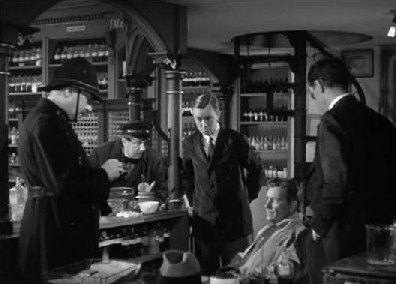
Charles Rainier is very disturbed to find that it’s 1920; three years of his life have disappeared into oblivion, and he has no idea what he’s been doing all this while. But he decides that the best course of action would be to return to his family. He therefore goes off to Random Hall, only to learn that his father’s died four days back, and the entire family—Charles Rainier’s siblings and their spouses—have gathered at the hall after the funeral. Nearly all are surprised but happy that Charles is back.

Kitty (Susan Peters), the fifteen-year old stepdaughter of one of Charles’s sisters, is infatuated from the word go. She hangs on Charles’s every word, and when it’s time to go, bulldozes him into agreeing to keep in touch—and to have her visit Random Hall during the holidays.

Charles finds himself at a loose end at Random Hall, not least because he keeps mulling over those three lost years of his life. The only clue he has is a door key, but no idea which door it opens.
Years pass. Kitty has grown up and graduated, and is now a sophisticated young woman, still utterly fascinated by Charles. Charles, who has in the meantime made a name for himself as a businessman (the newspapers have dubbed him `The Industrial Prince of England’) eventually proposes to Kitty. She’s delirious with happiness and accepts straight off.

With Kitty wanting an early wedding (and probably a long honeymoon afterwards), Charles realises he’s going to be gone a long while. He knows, however, that he has no cause for concern. His extremely efficient secretary, Miss Hanson, will take everything in hand. So Charles calls in Miss Hanson, to announce his engagement and start making plans.
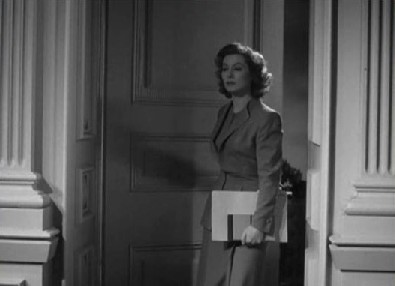
As you can see, this is the start of something interesting. Watch it: it’s worth every minute.
What I liked about this film:
Just about everything. But most especially, Greer Garson. She is such a wonderfully expressive actress, and so beautiful too. She is Paula—warm, irrepressibly cheery and optimistic, loving, and kind. And she is Miss Hanson, the efficient, poised, calm secretary who handles Charles Rainier’s business affairs with such thoroughness. And she is much more (which I won’t tell!). Random Harvest merits a watch for Garson’s performance, if not for anything else: she’s marvellous.

What I didn’t like:
Ronald Colman. Yes, he’s a fine actor; his eyes speak: you can see the frustration, the anguish and the uncertainty of Smithy in them, and the nagging doubt of Charles Rainier, who isn’t sure what he did in the three missing years of his life. But—and this is a very emphatic but—he’s just not my idea of a romantic hero. He looks tired and fortyish all through the film, even when Kitty’s going on telling him how handsome he is.
Now, if I’d been given the casting of this film, I’d probably have had Laurence Olivier in this. Perhaps even Robert Donat. But not Ronald Colman.
Still, a fabulous film. And ah, such a touching end. It got seven Oscar nominations, by the way, including Best Picture.

I loooooove this film (how can one resist such a well done romance) and try to catch it everytime it plays on TCM. They both look so lovely together and their little cottage is so sweet – I want to have one when I retire!
This one was remade in Bengali as Harano Sur with Uttam Kumar and Suchitra Sen in the lead and that version was even better (lovely songs)!
And you dont like Ronald Coleman?!! He reminds me of Raj Kapoor – its a bit that smile and a bit that moustache. Still, after this movie I loved him! He was pretty good as the idealistic judge in The Talk Of The Town (one of Cary Grant’s few “serious” comedies) as well.
LikeLike
“This one was remade in Bengali as Harano Sur with Uttam Kumar and Suchitra Sen in the lead and that version was even better (lovely songs)!”
..
The Bengali film had a better story line and Suchithra Sen was ravisingly lovely.
LikeLike
I’ve never even heard of this one…I can see that I’d better watch out or my house will be filled with even more DVDs I don’t have time to watch :(
LikeLike
bollyviewer: Yes, so absolutely wonderful, isn’t it? Just thinking about the film brings a smile to my face (now that sounds really cheesy, but it’s true!). And sorry, I just couldn’t bring myself to like Ronald Colman. Actually, now that I come to think of it, the Raj Kapoor resemblance might be to blame – I don’t like him either! ;-) But will definitely look out for Harano Sur: I adore both Uttam Kumar and Suchitra Sen!
memsaab: Do watch: if you like romances (which I think you do, from whatever I’ve read of your posts so far!) you’ll probably like this one. Highly recommended, just in case you haven’t guessed yet!
LikeLike
sounds like a good movie!
thanks for introducing it to us.
LikeLike
thank you!
LikeLike
I watch this movie over and over…I look for different nuances/themes each time.
The amount of Christian imagery in the film: hope, love, faith, perserverance, etc. Smithy marries Paula…then in the Chapel with Kitty, an almost marriage…he remembers. This spurs on Kitty to reveal her feelings…there’s someone else. This gives him the “key” he’s looking for, and needing, apart from the key he keeps and protects in his vest pocket year after year.
Time and Chance: examine the movie and notice how much time and chance played in the story…it’s one of the most powerful threads in the film, time and chance; or, is God really involved?
LikeLike
That’s an interesting insight into the film! I must watch it again, will probably be able to see more of that. And yes, I agree completely re: the Christian imagery. There’s a lot of that in the film (interestingly, the one time Smithy sees Paula on stage, the song she’s singing – though it’s a funny one – is about a wedding).
LikeLike
I’ll have to disagree with you about Laurence Olivier. He’s so crusty and stone-faced even in his younger years; he would’ve ruined Smitty completely. I liked him in “The Boys From Brazil” though.
Anyway, here are the reasons I thought Coleman was perfect for Smitty:
-Found him charming, in a way that I never found Olivier to be.
-“Tired” look contributes to “the frustration, the anguish and the uncertainty of Smithy”
-He seems so innocent, helpless, and in need of love; perfect contrast to the confident, capable, and loving Paula.
LikeLike
Though I don’t agree about Olivier, I do agree that the tiredness and helplessness that Coleman portrays help make Smithy a more believable character… on the other hand, I think the Max de Winter that Olivier portrayed in Rebecca was also an interesting man, outwardly cold and self-assured, but deep down scared and in need of love. Maybe Olivier wouldn’t have been such a very bad Smithy. But who knows?
LikeLike
My all time favorite movie. I saw it when I was 12 years old (1962) and have never forgotten it. I cannot imagine anyone else as “Smithy” as I have grown so accostomed to his mannerisms, charm, and wonderful voice. How about ……….Walter Pidgeon. She was married to him in so many movies, I almost feel she is being unfaithful with Ronald Colman. Just kidding.
This movie is a complete masterpiece! I have watched it hundreds of times, and recommend it to so many people who ultimately fall in love with it too.
Greer Garson, a subject all its own. Have you ever seen her in a movie where she did not positively light up the screen. I don’t think I have every seen another actress who radiates the warmth of personality that she does. Watching her is like sitting in front of a cozy fire on a snowy day. She is absoutely CHARMING. This lady was made for the big screen. Since 1962 I have wanted to move into that small Devon cottage by the chape, babbling brook, and stone bridge, replete with an apple blossom tree by the front gate; sit by the fire with Smithy, and live happily ever after.
LikeLike
Your enthusiasm for Random Harvest shines through in every word of that comment – and it’s tempted me to rewatch the film all over again! It’s been a long time since I watched it last….
And yes, I love Greer Garson. She has this somehow very fragile and ethereal look to her, yet a sort of look of deep strength and maturity that makes her look capable of taking on the world and coming through. Wonderful.
LikeLike
I dont know if u r male or female, but u r wrong about colman no one could have played smithy. as a woman. i thought colman was very handsome even if he was older in the part. love love the film
LikeLike
Well, that’s your opinion, and you’re entitled to it – just as I am entitled to mine; I wouldn’t say you’re wrong or I am wrong. It’s just a question of two different points of view.
For the record, I’m a woman.
LikeLike
Thank you so much. I saw this film when I was a child one Sunday afternoon on TV and have never forgotten it- except I could not remember the title & didn’t know the actors. Typing ‘film about a man who loses his memory and comes out of an asylum in a pea souper fog led me to your site. So now I know & can look for it! A fabulous film.
LikeLike
I’m so glad I was able to help you find a long-forgotten film! I know what it feels like to be groping for the name of a much-loved book or film, and not being able to remember it – it’s happened often enough to me with films I watched when I was a child! Thank goodness for the Net; it makes searching so much easier.
LikeLike